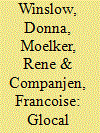|
|
|
Sort Order |
|
|
|
Items / Page
|
|
|
|
|
|
|
| Srl | Item |
| 1 |
ID:
119502


|
|
|
|
|
| Publication |
2013.
|
| Summary/Abstract |
In Chechnya a protracted conflict only seemingly quieted down, but it still smolders and as the conflict is suppressed by coercion, it is inevitable that it will flare up at some time in the near future. The root causes of the conflict can be understood by use of globalization theory, which dialectically brings together the clashing forces from above and below. Civil society in Chechnya deteriorated, is politically curtailed, and has no resilience left. It thus results in a frozen conflict and an excluded and victimized society. Russian-style reconstruction does alleviate living conditions, but does not remediate the frozen conflict character of the present situation. The dynamics of the globalizing forces from below and above, summarized in the glocalization concept, not only explains the resistance by the Chechen people, for whom revolt, rebellion, and terrorism remain attractive options, but also serves as a model for other insurgencies. Reflecting on the two recent Chechen-Russian wars results in a paradigmatic case study.
|
|
|
|
|
|
|
|
|
|
|
|
|
|
|
|
| 2 |
ID:
171124


|
|
|
|
|
| Summary/Abstract |
Cross-border trade is central to the socio-economic structure of the former Soviet republics and their integration in the world economy. In the Caucasus and Central Asia, bazaars have functioned as nodes that enable multi-directional, cross-border trade. While there have been studies on the bazaar trade in the Soviet successor states, few have used quantitative methods. Drawing from 600 structured interviews with traders in Dordoi (Bishkek) and Lilo (Tbilisi), the data from Dordoi highlight the relationship between informality and entrepreneurship, unlike Lilo, where there are clearer markers of formality, but where bazaar trade also seems to be less profitable. The data from the 600 interviews illustrate that Dordoi functions as a globalized trading hub, its transnational linkages forged by the bazaar traders and the buyers themselves. By contrast, trade in Lilo is more localized. Hence, ‘globalization from below’ presents itself differently across the post-Soviet space.
|
|
|
|
|
|
|
|
|
|
|
|
|
|
|
|
|
|
|
|
|